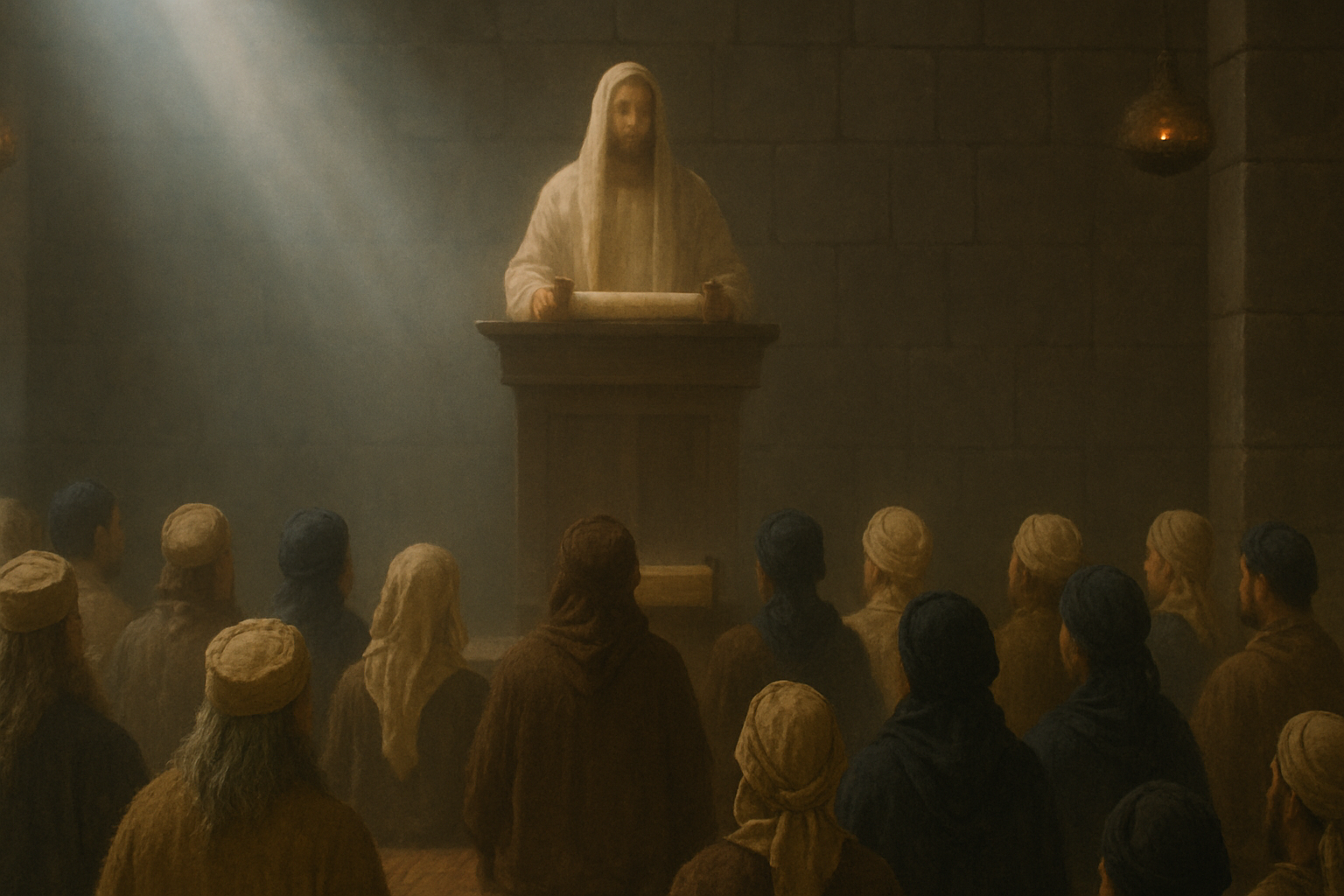Author: David Wilber
Roughly 2.18 billion people around the world profess to be a Christian. No matter what their denomination might be, most of them value the Ten Commandments to some degree. In fact, in America, whenever some organization like the ACLU threatens to remove a monument of the Ten Commandments from public property, you can expect Christians to gather by the hundreds to protest. Yet the majority of those same Christians don’t consider the fourth commandment—the Sabbath—to be particularly important or relevant for today.
Why do you suppose the majority of today’s Christians don’t keep the Sabbath the way the Bible says to keep it? Does God care about whether we keep it? Was it given only to a specific group of people before the time of Christ? Was the Sabbath changed or taken to a “spiritual” level, replacing the literal application of the commandment? This article will take a closer look at this important topic. We’ll discover what the Bible—our final authority on all matters of faith and practice—truly says about the Sabbath and how it applies to us today.
Does God Care?
The first question we need to answer is, Does God care about the Sabbath? This question should be simple enough to answer. He cared enough about the Sabbath to command His people to keep it. Indeed, keeping the Sabbath was so serious in theocratic Israel that the Torah required capital punishment of anyone who broke it (Exodus 31:14-15). And the constant breaking of the Sabbath is explicitly mentioned as one of the reasons God judged Israel throughout the twentieth chapter of Ezekiel. When one takes an honest look at the scriptures concerning this topic, it’s clear that God cares—or at least He did at one time.
Did something change? Yes ... but it wasn’t God’s Word. Yeshua (Jesus) affirmed the validity of the Sabbath in Matthew 5:17-20 when He said that not one jot or tittle will pass from the Torah until heaven and earth pass away and all is accomplished. (Note: that hasn’t happened yet.) Furthermore, the original Christians continued to do and teach the commands of the Torah throughout the New Testament—including the Sabbath (Acts 13:14, 42, 44; 16:13; 17:1-2; 18:4; Romans 3:31). And Paul said that "all Scripture" is profitable for teaching, reproof, correction, and training in righteousness (2 Timothy 3:16). Certainly "all Scripture" includes the command to rest on the Sabbath day.
So what did change?
In the early second century, the practice of many Christians with regard to the Sabbath had begun to change. Many Christians began to put aside Sabbath observance in favor of Sunday observance. (It should be noted that not all Christians throughout history accepted this change. For instance, among other Christian groups, the Nazarenes continued to observe the Sabbath on the seventh day.) Several factors, including a growing anti-Jewish sentiment among Christians, played into this gradual shift from Sabbath to Sunday. While a faithful minority of Christians continued to keep the Sabbath—many observing both the seventh day as the Sabbath and the first day (Sunday) as the “Lord’s Day”—the majority of Christians had abandoned a literal observance of this commandment. It was after Constantine’s edict in 321 AD, declaring Sunday the official day of rest of the Roman Empire, that Sunday started to become widely recognized as the “Christian sabbath.”
In more recent history, the church has drastically departed from historic Christianity in terms of how it values some of the commandments of God. Much of the current church tradition teaches that Christians are not required to keep the fourth commandment at all—at least not in any literal sense. But is there a biblical basis for these teachings?
Below we will explore some of the common objections that many Christians have to resting on the seventh-day Sabbath.
Objection #1: The Sabbath was given only to the Jewish people.
Many Christians reject the idea that we are to keep the Sabbath because they see it as a law given only to Israel in order to set them apart from other nations. It is argued that Christians are not part of the covenant that God made with Israel; therefore, we are not required to keep some of the commandments given in the Torah. (See my teaching 5 Reasons Christians Should Keep The Torah)
Was God’s intention really for only the Jewish people to keep the Sabbath? Dr. Craig Keener, PhD, weighs in:
As I tried to study the biblical text honestly, I could see that this was not just a matter of keeping laws designated for Israel; God actually modeled the Sabbath rest in creation (Gen 2:2-3). Whether we take that narrative literally or not, the principle of the Sabbath is there, and it apparently is an example for all people, not just those who are ethnically descended from Abraham.
Interestingly, the fourth commandment passage itself mandates a Sabbath rest for not only Israel, but also for “the sojourner” and even animals (Exodus 20:10). So even when the Sabbath is given within the context of God’s covenant with Israel, the command to rest was not given to Israel exclusively. The sojourner was also instructed to rest on the Sabbath.
In addition, Isaiah 56:3-8 speaks of “the foreigner who has joined himself to the Lord.” Scripture describes these foreigners as ones who keep the Sabbath and hold fast to the covenant. And because of that, God is pleased and they are promised an “everlasting name that shall not be cut off.” This passage is a clear example of how God desires to be worshiped in His “house of prayer for all peoples.”
As we can see, the Sabbath command was not exclusive to Israel in the Old Testament. There's really no debate that non-Israelites were also to keep the Sabbath. But what about in the New Testament? While it is true that Gentile believers are not explicitly commanded to keep the Sabbath in the New Testament, we cannot use that as our basis for saying that Gentile believers shouldn’t keep it. The New Testament doesn’t reiterate many commandments found in the Torah, such as “don’t practice necromancy,” yet Christians still believe we should keep them. Furthermore, Yeshua’s instructions to His disciples just prior to His ascension were to make disciples of “all the nations” and teach them all that He had commanded them (Matthew 28:19-20). “All” that He commanded them most certainly would have included the Sabbath as it is part of the Torah that Yeshua affirmed in Matthew 5:17-20. Therefore, the Torah—including the Sabbath—is applicable doctrine for all who follow Yeshua, Jew and Gentile.
Objection #2: Jesus did away with the Sabbath commandment.
Many Christians today claim that the Sabbath is fulfilled in Christ, which according to them means that we don’t have to keep it anymore—at least not in the literal sense that the Bible describes. It is believed that Yeshua brought the Sabbath to a higher meaning in the New Covenant, which somehow annuls its practical application. Let’s take a look at a few New Testament passages that are commonly used to support this theory.
Matthew 12:1-2
At that time Jesus went through the grainfields on the Sabbath. His disciples were hungry, and they began to pluck heads of grain and to eat. But when the Pharisees saw it, they said to him, “Look, your disciples are doing what is not lawful to do on the Sabbath.”
Did Yeshua condone His disciples breaking the Sabbath in this passage? If so, wouldn’t these verses demonstrate that the practical application of the Sabbath is fading away and it’s not that important anymore in the New Testament?
First of all, as we’ve already seen, Yeshua completely affirms the validity of the Sabbath as part of the Torah in Matthew 5:17-20. Why would He condone His disciples breaking the Sabbath shortly after He affirmed it? Secondly, this dispute between Yeshua and the Pharisees was not about whether or not to keep the Sabbath; it was about how to keep the Sabbath. Yeshua’s disciples were breaking the Sabbath only according to the Pharisees’ interpretation. The Bible never prohibits plucking heads of grain on the Sabbath. So Yeshua proclaimed his disciples “innocent” of wrongdoing (Matthew 12:7) and rebuked the Pharisees for completely missing the entire point of the Sabbath in their strict interpretations.
Colossians 2:16-17
Therefore let no one pass judgment on you in questions of food and drink, or with regard to a festival or a new moon or a Sabbath. These are a shadow of the things to come, but the substance belongs to Christ.
Is this passage saying that anyone who teaches obedience to the fourth commandment is a judgmental legalist who emphasizes the “shadow” over the substance? Who are these judgmental people that Paul is warning against?
If we look earlier in the passage at Colossians 2:8 we see that Paul is warning the Colossian believers about those who are trying to lead them astray through deception and “human tradition.” But the Sabbath is not a “human tradition.” Moreover, these false teachings are said to be in opposition to the teachings of Messiah, but the Messiah affirms and teaches Torah. Indeed, Paul himself affirms the validity of Torah as part of “all Scripture” in 2 Timothy 3:16. As Tim Hegg explains, a more likely explanation is that these false teachers were judging the Colossian believers for how they kept the Sabbath:
The point is that the false teachers are judging the Colossian believers in regard to their halachah in observing the Torah commandments relating to food, drink, festivals, new moons and the Sabbath. The false teachers are telling the Colossians that unless they observe the commandments in strict adherence to their particular halachah, they are not actually keeping the commandments at all and will therefore fall under the judgment of God. It is the common Christian interpretation of these verses that Paul had taught the Colossian believers to disregard the Torah regulations of kosher foods and appointed times, and that the false teachers were trying to persuade them that these were necessary. But that interpretation neither fits the wider teaching of Paul nor the immediate context. The false teachers are suggesting that the Colossians are failing to observe the commandments as they had determined they should be observed, not that the Colossians had entirely neglected the commandments.
It’s important to note what Paul does not say. He doesn’t say that the Sabbath is abolished or no longer literally applicable in the New Covenant. He was merely warning the Colossian believers against false teachers judging them with regard to how they observe certain commandments.
Romans 14:5
One man considers one day more sacred than another; another man considers every day alike. Each one should be fully convinced in his own mind.
Many Christians assume that Paul is referring to the Sabbath in this passage, but the Sabbath is never explicitly mentioned anywhere in the book of Romans. Since the text is unclear on the type of “day” being addressed in this passage, it is not necessary to conclude that Paul must be referring to the Sabbath. Furthermore, the context of this verse is in regards to “opinions” or “disputable matters” (verse 1). Surely in Scripture the fourth commandment is never regarded as merely a matter of opinion.
So what exactly is Paul talking about when he says we must be fully convinced in our own mind when it comes to sacred days? Greek scholar J.K. McKee offers this explanation:
Few consider the possibility that “eats” in 14:3 could be helping to introduce the sacred days specified in 14:5. When this is taken into consideration, we see that there were, in fact, various fixed days for fasting on the Jewish religious calendar, such as those remembering the fall of Jerusalem and destruction of the First Temple. I would submit that when “he who eats, does so for the Lord, for he gives thanks to God; and he who eats not, for the Lord he does not eat, and gives thanks to God” (14:6b, NASU), is discussing optional fast days, as opposed to eating meat—the second part of Paul’s argument on disputable matters. Just as it would be inappropriate to judge fellow Believers who only eat vegetables, so would it also be inappropriate to judge fellow Believers who might observe special fast days for reasons that are very important to them.
So the “opinions” over which days to hold sacred could have had to do with fast days, which would seem to fit better with the context. In either case, it’s clear that this passage cannot be used to support the idea that the Sabbath is no longer important.
Objection #3: The Sabbath was changed to Sunday.
While it is true that the majority of Christians have traditionally come to hold to a Sunday Sabbath, our primary concern ought to be what the Bible teaches. As Tim Hegg says, “We cannot use history as the litmus test of truth, for God has not commanded us to conform to history, but to the unchanging standard of His word.” Is there any biblical basis for changing the Sabbath from the seventh day to Sunday? Only two verses in the New Testament are sometimes used to support this idea: Acts 20:7 and 1 Corinthians 16:2.
Acts 20:7
On the first day of the week, when we were gathered together to break bread, Paul talked with them, intending to depart on the next day, and he prolonged his speech until midnight.
Because this passage says that these early Christians gathered “on the first day of the week,” some will argue that a shift from Sabbath observance to Sunday church occurred. But how exactly does that conclusion follow from a plain reading of the text? For all we know this could have just been a special one-time gathering put together because Paul was departing the next day. Why would we assume that this gathering took place every week? Moreover, why would we then make the leap in suggesting that this meeting implies a replacement of the Sabbath?
1 Corinthians 16:2
On the first day of every week, each of you is to put something aside and store it up, as he may prosper, so that there will be no collecting when I come.
Again, why is it assumed that this must be referring to the collection plate being passed around at Sunday church services? The text doesn’t suggest that this has anything to do with a meeting day. Paul is merely requesting that the Corinthian believers set aside savings as an offering to be sent to the saints in Jerusalem (verse 1). The instruction was for individual believers to put aside savings every week for this special offering so that when Paul arrived it would be available. The text doesn’t indicate that any corporate gathering is in view at all.
In conclusion, there appears to be no biblical basis for changing or ignoring the Sabbath. Nowhere in the Bible does God, Yeshua, or the apostles authorize its change or annulment. Rather, the replacement and eventual disregard for the Sabbath in Christianity happened over time as Christians gradually drifted further and further away from the Jewish roots of their faith. May we as believers revisit this important commandment and get back to biblical practice. May we no longer trade the commands of God for the traditions of men.
If you have questions about the Sabbath, please feel free to contact me.
About David Wilber
David is first and foremost a passionate follower of Yeshua the Messiah. He is also a writer, speaker, and teacher.
David’s heart is to minister to God’s people by helping them rediscover the validity and blessing of God’s Torah and help prepare them to give an answer to anyone who asks about the hope within them (1 Peter 3:15)…
































